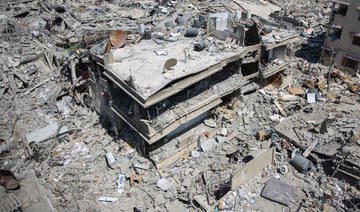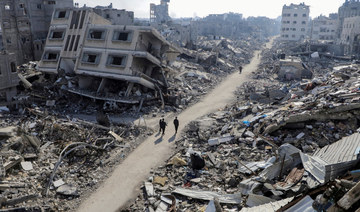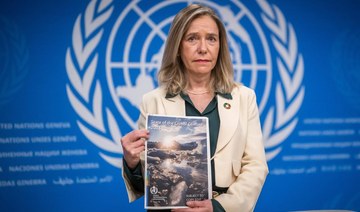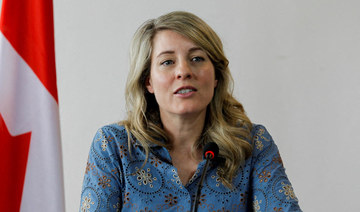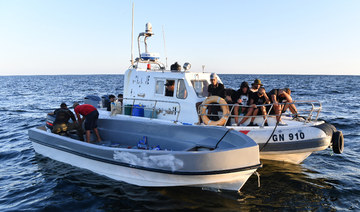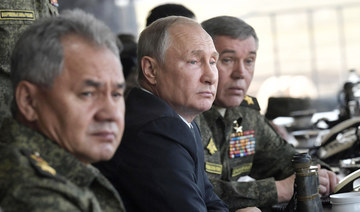ROME: Italy reported a 45% one-day increase in people infected with the coronavirus as other countries in Europe recorded their first cases Tuesday, producing evidence that travelers are carrying the virus from the European outbreak’s current epicenter.
Italian officials reported 11 deaths and 322 confirmed cases of the virus, 100 more than a day earlier. While the majority were concentrated in northern Italy, some of the new cases showed up in parts of Italy well outside the country’s two hard-hit regions, including three in Sicily, two in Tuscany and one in Liguria.
An Italian couple from the afflicted north tested positive in the Canary Islands off Africa, forcing the quarantine of their hotel in what one guest said felt like being “monkeys in a cage.” Austria, Croatia and Switzerland reported their first cases, all in people who recently traveled to Italy.
The four new deaths in Italy, like the seven reported earlier, were in patients who were elderly, suffering from other ailments, or both, officials said.
Italian Premier Giuseppe Conte defended the measures Italy has taken to contain the outbreak and predicted a stabilizing of numbers soon. But he acknowledged that the rise in cases — the most outside Asia — was “worrisome.”
“Obviously I can’t say I’m not worried because I don’t want anyone to think we’re underestimating this emergency,” he said before a meeting with a visiting World Health Organization mission. “But we trust that with the measures we’ve implemented there will be a containing effect in the coming days.”
Italy has closed schools, museums and theaters in the two regions where clusters have formed and troops are enforcing quarantines around 10 towns in Lombardy and the epicenter of the Veneto cluster, Vo’Euganeo.
But Italy hasn’t yet identified the source of the outbreak. Angelo Borrelli, the head of the Italian civil protection department, said the increase in cases from 222 to 322, representing a 45% increase, came from people who tested positive for the virus in a 24-hour period from Monday evening to Tuesday evening.
The southern island of Sicily reported its first three positive cases from a woman vacationing from Bergamo, in Lombardy and two others traveling with her. Two cases were also reported in Tuscany, south out of the epicenter.
Spain counted three active cases: a woman in Barcelona who had been in Lombardy in recent days, and a doctor from northern Italy and his partner who were vacationing in Tenerife, in the Canary Islands.
The hotel where the couple was staying, the H10 Adeje Palace was locked down after they tested positive for the virus and 1,000 tourists prevented from leaving, according to Spanish news media and town officials in Adeje.
“We do remain patient but we haven’t had anything to eat and drink at the hotel today,” Harriet Strandvik, the mother in a family of four stuck at the hotel, told Finnish newspaper Ilta-Sanomat. “We feel a little bit like monkeys in a cage here as there are media representatives present near the hotel and police officers guarding the area are wearing masks.”
The Canary Islands, an archipelago located around 100 kilometers (60 miles) west of the African coast, is a popular vacation destination that attracts Europeans year-round. Many Italians are vacationing this week as schools have a mid-winter break.
Conte shocked Lombardy officials by taking to task the hospital in Codogno, southeast of Milan, where Italy’s first positive patient went on Feb. 18 with flu-like symptoms. The man was sent home, only to return a short time later with worsening conditions, at which point he was tested for the virus.
Many of Lombardy’s 200-plus positive tests have a traceable connection to the Codogno hospital, including several doctors and nurses, patients and relatives who visited them.
Conte told reporters that the Lombardy cluster grew “because of the hospital management that wasn’t completely proper according to the protocols that are recommended for these cases.”
“This surely contributed to the spread,” he said.
Lombardy’s chief health official, Giulio Gallera, expressed shock at Conte’s remarks and defended the region’s handling of the crisis.
“It’s offensive. It’s unacceptable,” Gallera said, noting that the man presented none of the main risk factors for the virus — travel to China or contact with an infected person — when he first went to the emergency room.
The man was eventually tested after doctors ascertained from his wife that he had met with someone who had recently returned from China. But officials have excluded that contact as the source of the outbreak since that person tested negative.
As officials worked to get ahead of the spread nationally, the reality of a two-week quarantine was setting in for residents of Italy’s isolated “red zones” — the cluster of 10 towns in Lombardy and Veneto’s tiny Vo’Euganeo.
“The concern is palpable, people are worried, partly because of what they hear on television, information, on social media,” said Davide Passerini, the mayor of Fombio, one of the Lombardy towns under lockdown. “Life is like it is in other isolated villages: Everything is shut, people go out just to do their shopping.”
And they wait to see if they develop symptoms.
Italy initially tested anyone who came into contact with an infected person. But with the numbers growing and supply issues with test kits, masks and protective gear, Italy’s national health system revised its containment strategies.
People who live or have visited the quarantined areas, or who who have been in contact with positive cases, are advised to self-quarantine for two weeks. They are instructed to take their temperatures twice a day, and stay in touch with their doctors or the national health service via an overwhelmed toll-free number.
Only if they develop symptoms are they tested, most often by a team performing house calls to prevent hospitals and clinics being overly stressed, said Elia Delmiglio, mayor of Casalpusterlengo, another of the 10 towns in Lombardy’s “red zone.”
“Local health structures are doing their best, but in some cases they were not ready to face such an emergency,” Delmiglio said.
The town — with more than 15,000 inhabitants — doesn’t have a working emergency room, only a hospital mainly specializing in cancer patients, who are particularly at risk for contracting the virus.
In another hotbed of the virus outbreak — Veneto’s tiny town of Vo’Euganeo, which has most of Veneto’s 43 cases — local authorities were still planning to test all 3,300 residents and 600 acting hospital staff.
“I’m being optimistic and I feel well,” said resident Andrea Casalis, as he waited to be tested. “People continue to go out here and talk in the streets, but we try to keep some security distance.”
Tuesday sees Italy virus cases rise 45%; 11 dead
https://arab.news/g2edd
Tuesday sees Italy virus cases rise 45%; 11 dead
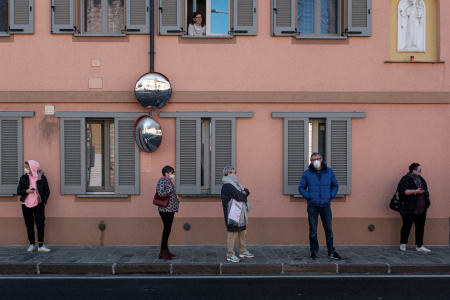
- Infections in other European countries traced to people who had recently travelled to Italy
- The country has the most confirmed cases in Europe
US Congress passes Ukraine, Israel foreign aid bill

- Israel has killed more than 34,000 civilians in the Palestinian enclave
WASHINGTON: A sweeping foreign aid package easily passed the US Congress late on Tuesday after months of delay, clearing the way for fresh Ukraine funding amid advances from Russia’s invasion force and Kyiv’s shortages of military supplies.
The Senate approved by 79 to 18 four bills passed by the House of Representatives on Saturday, after House Republican leaders abruptly switched course last week and allowed a vote on the $95 billion in mostly military aid for Ukraine, Israel and Taiwan and US partners in the Indo-Pacific.
The four bills were combined into one package in the Senate.

The largest provides $61 billion in critically needed funding for Ukraine; a second provides $26 billion for Israel and humanitarian aid for civilians in conflict zones around the world, and a third mandates $8.12 billion to “counter communist China” in the Indo-Pacific.
A fourth, which the House added to the package last week, includes a potential ban on the Chinese-controlled social media app TikTok, measures for the transfer of seized Russian assets to Ukraine and new sanctions on Iran.
Biden has promised to sign the measure into law as soon as it reaches his desk, and his administration is already preparing a $1 billion military aid package for Ukraine, the first to be sourced from the bill, two US officials told Reuters.
The Senate’s Democratic and Republican leaders predicted that Congress had turned the corner in putting Russian President Vladimir Putin and other foreign adversaries on notice that Washington will continue supporting Ukraine and other foreign partners.
“This is an inflection point in history. Western democracy perhaps faced its greatest threat since the end of the Cold War,” Democratic Majority Leader Chuck Schumer said in the Senate.
The aid package could be the last approved for Ukraine until after elections in November when the White House, House of Representatives and one-third of the Senate are up for grabs.
Much of the opposition to the security assistance in both the House and Senate has come from Republicans with close ties to former US President Donald Trump, a Ukraine aid skeptic who has stressed “America First” policies as he seeks a second term.
Senate Republican Leader Mitch McConnell, a strong advocate for assisting Ukraine, expressed regret about the delay, largely due to hard-line Republicans’ objections to adding more to the $113 billion Washington had authorized for Kyiv since Russia began its full-scale invasion in February 2022.
“I think we’ve turned the corner on the isolationist movement,” McConnell told a news conference.
Some of the Ukraine money — $10 billion in economic support — comes in the form of a loan, which Trump had suggested. But the bill lets the president forgive the loan starting in 2026.
HUMANITARIAN CONCERNS
The influx of weapons should improve Kyiv’s chances of averting a major breakthrough in the east by Russian invaders, although it would have been more helpful if the aid had come closer to when Biden requested it last year, analysts said.
It was not immediately clear how the money for Israel would affect the conflict in Gaza. Israel already receives billions of dollars in annual US security assistance, but it more recently has faced its first direct aerial attack by Iran.
Aid supporters hope the humanitarian assistance will help Palestinians in Gaza, which has been devastated by Israel’s campaign against Hamas to retaliate for Oct. 7 attacks that killed 1,200 people.
Gaza health authorities say the campaign has led to the deaths of more than 34,000 civilians in the Palestinian enclave.
It was the second time this year that the Democratic-led Senate passed security aid for Ukraine, Israel and the Indo-Pacific. The last bill, more than two months ago, garnered 70 percent support in the 100-member chamber from Republicans and Democrats. But leaders of the Republican-controlled House would not allow a vote on the foreign aid until last week.
The legislation’s progress has been closely watched by industry, with US defense firms up for major contracts to supply equipment for Ukraine and other US partners.
Experts expect the supplemental spending to boost the order backlog of RTX Corp. along with other major companies that receive government contracts, such as Lockheed Martin , General Dynamics and Northrop Grumman.
The House passed the Ukraine funding by 311-112, with all “no” votes coming from Republicans, many of whom were bitterly opposed to further assistance for Kyiv. Only 101 Republicans voted for it, forcing Speaker Mike Johnson to rely on Democratic support and prompting calls for his ouster as House leader.
However, the House left Washington for a week-long recess, without triggering a vote to remove Johnson.
NASA chief asks nations to work together on climate change
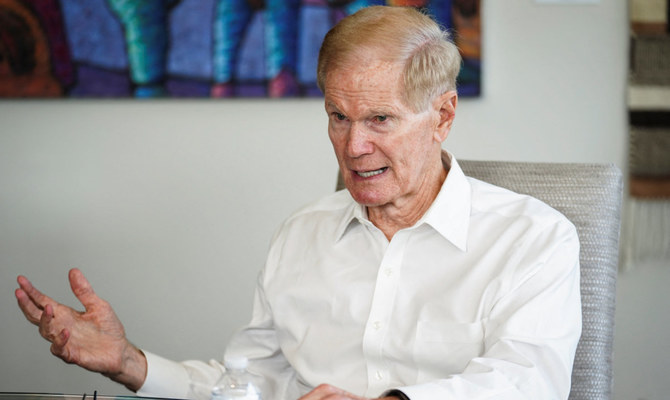
- Solutions to mitigate greenhouse gas emissions that rapidly warm the planet and drive the climate crisis already exist, but require unprecedented changes at a new scale and pace
MEXICO CITY: NASA is hoping that nations will work together more closely in the future on topics such as climate change, including greenhouse gas emissions, the space agency’s head, Bill Nelson, said on Tuesday.
Solutions to mitigate greenhouse gas emissions that rapidly warm the planet and drive the climate crisis already exist, but require unprecedented changes at a new scale and pace.
“This is something that nations can work on together because the information is there,” Nelson said in Mexico City when asked about how to address greenhouse gas emissions. “It’s important that we act on it.”
Satellites have emerged as powerful tools for scientists around the world to study climate change but also, increasingly, pinpoint the origin of greenhouse gas emissions, such as methane leaks, that would otherwise have gone undetected.
Nelson added that satellites were constantly collecting data about climate and NASA was looking to make this data accessible, and educate people on how to use it.
Methane, the main component of natural gas, is the second-largest contributor to global warming after carbon dioxide. Scientists can now pinpoint the origin of large methane leaks using data gathered by satellites.
It is a much more potent driver of global warming in the short term than carbon dioxide because it traps more heat in the atmosphere, ton for ton.
“The types of concerns that we have are global,” said NASA Deputy Administrator Pam Melroy. “It’s very important to recognize that not any one country can solve that problem alone.”
Earlier in the day, Nelson and Melroy, who are both astronauts, met with Mexican President Andres Manuel Lopez Obrador and lawmakers to discuss how the countries can work together.
Canadian police charge 2 former UN employees with conspiracy to sell military equipment in Libya

- Poirier said Mhaouek, a Canadian citizen, was arrested Tuesday morning at his home in the Montreal suburb of Ste-Catherine, Que., and was scheduled to appear in a Montreal court later in the day
MONTREAL: Two former United Nations employees in Montreal have been charged with participating in a conspiracy to sell Chinese-made drones and other military equipment in Libya, Canadian police said Tuesday.
RCMP spokesman Sgt. Charles Poirier said the alleged offenses occurred between 2018 and 2021, when the two men were working at the International Civil Aviation Organization, a UN agency headquartered in Montreal.
Police identified the two men as Fathi Ben Ahmed Mhaouek, 61, and Mahmud Mohamed Elsuwaye Sayeh, 37. Poirer said they violated UN sanctions related to the Libyan civil war. The sanctions have the force of law in Canada by way of federal regulation.
“What we found is that through some shell companies, they attempted to sell this Chinese military equipment to Libya, which is a direct violation of the regulation,” Poirier said, adding that the military equipment included large drones that can carry multiple missiles.
Poirier said the regulation prohibits anyone in Canada from supplying military equipment to any of the factions that were fighting in the Libyan civil war, or helping to finance those groups. The alleged conspiracy, he said, would have benefited one of the two main factions in the conflict, which ended in 2020.
“The second part of this scheme was to export Libyan oil to China,” Poirier said. “So at the time, the oil fields were under the control of Gen. Khalifa Haftar and the plan was to sell millions of drums of crude oil to China without anyone knowing about it.”
Haftar’s self-styled Libyan National Army fought against Libya’s UN-backed government and held much of the country’s east during the civil war; he continues to be a powerful figure in that region.
Poirier said Mhaouek, a Canadian citizen, was arrested Tuesday morning at his home in the Montreal suburb of Ste-Catherine, Que., and was scheduled to appear in a Montreal court later in the day.
Mhaouek’s alleged accomplice remains on the run. An Interpol red notice — an alert sent to police around the world — and a Canada-wide warrant have been issued for Sayeh’s arrest.
Poirier said investigators have no indication that military equipment or crude oil ever reached their alleged final destinations, but he said if they had, the two co-conspirators stood to gain several million dollars in commissions.
“The theory behind the motivation is primarily financial,” he said. However, it would have also benefited China by allowing it to covertly support Haftar’s faction and by giving the country prime access to Libyan oil.
Poirier said the investigation began in 2022 after the RCMP received what he described as “credible intelligence.”
Both men had diplomatic immunity due to their work with the UN Their immunity had to be waived by ICAO before the two men could be charged.
The UN organization, which sets international aviation standards, has been collaborating with the police investigation.
“There’s no indication that ICAO was aware of the conspiracy until they were approached by us,” Poirier said.
Police don’t know where Sayeh, a Libyan national, may be.
“He could be in Libya, but with the level of influence and the networking that these men had working at ICAO, he could be anywhere,” Poirier said.
The UN’s civil aviation agency said in an emailed statement that it is committed to upholding Canadian laws, UN standards and its own ethics code.
“ICAO is fully cooperating with the RCMP investigation of the individuals involved in the complaint, who left the organization a number of years ago,” the agency said. “ICAO strongly condemns any actions of individuals that are inconsistent with the organization’s values.”
Rights concerns, costs undermine Turkiye-EU migrant deal, say auditors
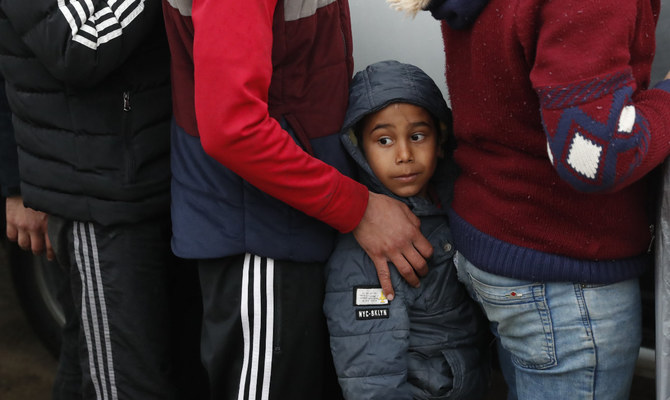
- EU Ombudsman Emily O’Reilly has launched an inquiry into human rights guarantees under the bloc’s new migration deal with Tunisia
BRUSSELS: Turkiye’s poor human rights record and economic factors are undermining the effectiveness of the European Union’s migration deal with Ankara, EU auditors said on Wednesday.
Under the 2016 deal, Ankara agreed to take back migrants who had crossed from its territory to Europe in return for EU aid to help fund more than four million refugees on Turkish soil.
The EU, which faces elections in June for the European Parliament in which illegal migration promises to be a big issue, has sealed agreements similar to the Turkiye scheme with Tunisia, Egypt, Mauritania and others.
In their report, the EU auditors raised concerns about the ability of non-governmental organizations (NGOs) to operate projects, as envisaged under the 6 billion euro ($6.4 billion) deal, given Turkiye’s authoritarian turn since a failed coup in 2016 and its crackdown on dissent.
“The operating situation of NGOs has continuously deteriorated since 2015 and has been exacerbated in the context of the unsuccessful... coup in Turkiye, where NGOs subsequently were targeted through various legislation,” it said.
The European Court of Auditors (ECA) report also cited the difficulty of managing the EU aid in the context of Turkiye’s economic downturn and Ankara’s “backsliding on the rule of law and fundamental rights.”
The report said the European Commission, the EU’s executive, had failed to provide an adequate analysis of costs and that it was unclear what would happen once the aid ended.
“The facility is beneficial for refugees and host communities but we would still like to see improvements in terms of demonstrating impact, ensuring sustainability, and value for money,” said Bettina Jakobsen, who led the ECA report.
Rights groups and some politicians have long accused the EU of neglecting human rights in its drive to curb illegal migration.
“This leads to the EU focusing less on issues that should be of relevance such as the neglect of human rights,” said Florian Trauner, a professor at the Brussels School of Governance.
EU Ombudsman Emily O’Reilly has launched an inquiry into human rights guarantees under the bloc’s new migration deal with Tunisia.
US, Russia set for a showdown at UN over nuclear weapons in space
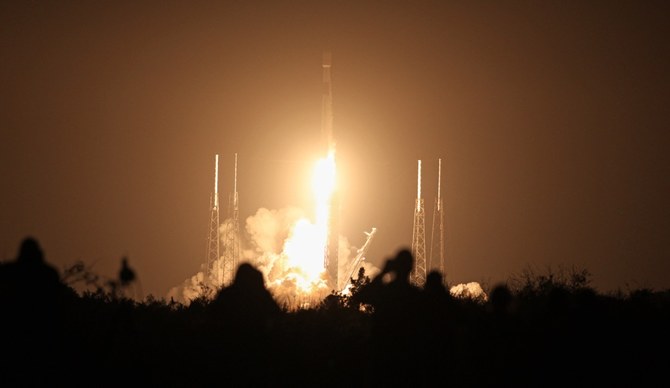
- The White House says Russia has not yet deployed such a weapon.
UNITED NATIONS/WASHINGTON: The United States and Russia are set to face off over nuclear weapons in space on Wednesday at the United Nations Security Council, which is due to vote on a US-drafted resolution calling on countries to prevent an arms race in outer space.
Russia is expected to block the draft resolution, said some diplomats. The US move comes after it accused Moscow of developing an anti-satellite nuclear weapon to put in space, an allegation that Russia’s defense minister has flatly denied.
US Ambassador to the UN Linda Thomas-Greenfield and Japan’s UN Ambassador Yamazaki Kazuyuki said in a joint statement on Friday that they have been negotiating with Security Council members on the draft text for six weeks.
The text affirms the obligation of states to comply with the Outer Space Treaty and calls on countries “to contribute actively to the objective of the peaceful use of outer space and of the prevention of an arms race in outer space.”
The 1967 Outer Space Treaty bars signatories – including Russia and the United States – from placing “in orbit around the Earth any objects carrying nuclear weapons or any other kinds of weapons of mass destruction.”
Russia and China are planning to first put an amendment to a vote in the council. The amendment echoes a 2008 proposal by the pair for a treaty banning “any weapons in outer space” and threats “or use of force against outer space objects.”
The amendment is not expected to be adopted, said diplomats. The amendment and the draft resolution each require at least nine votes in favor and no vetoes by Russia, China, the United States, Britain or France to be adopted.
“Without our amendment, based on the General Assembly resolution adopted in December 2023, the text tabled by the US will be unbalanced, harmful and politicized,” deputy Russian UN Ambassador Dmitry Polyanskiy told Reuters, adding that it would also undermine the Outer Space Treaty legal regime.
Polyanskiy said “all questions relating to this sphere should be considered by the full membership of States Parties to this Treaty and not by the UN Security Council members only.”
US intelligence officials, according to three people familiar with their findings, believe the Russian capability to be a space-based nuclear bomb whose electromagnetic radiation if detonated would disable vast networks of satellites.
White House National Security Council spokesman John Kirby has said Russia has not yet deployed such a weapon.
Russian President Vladimir Putin said in February that Russia was against the deployment of nuclear weapons in space.
Governments have increasingly viewed satellites in Earth’s orbit as crucial assets that enable an array of military capabilities on Earth, with space-based communications and satellite-connected drones in the war in Ukraine serving as recent examples of the outsized role of space in modern warfare.
Russia invaded neighboring Ukraine in February 2022.





